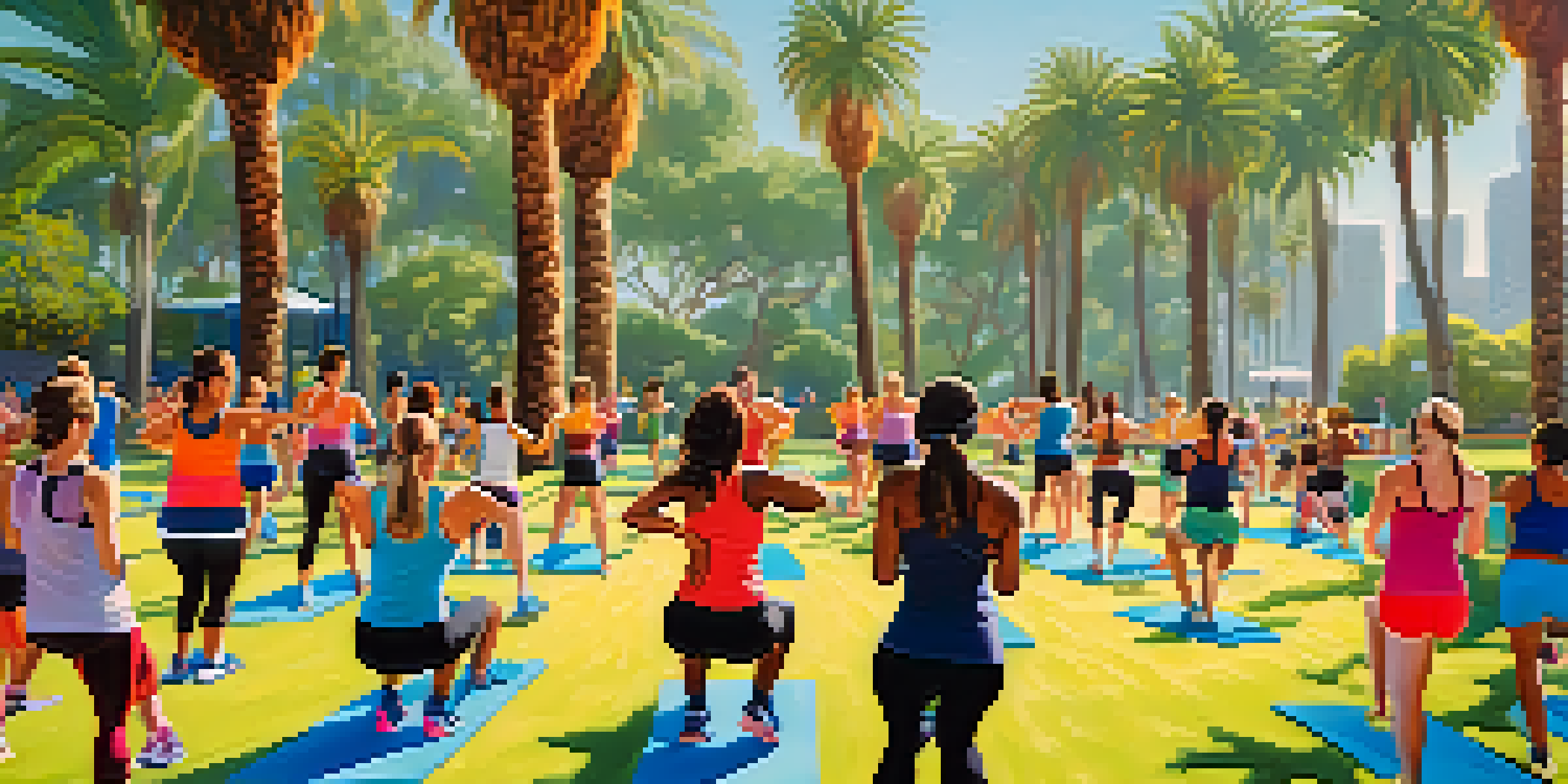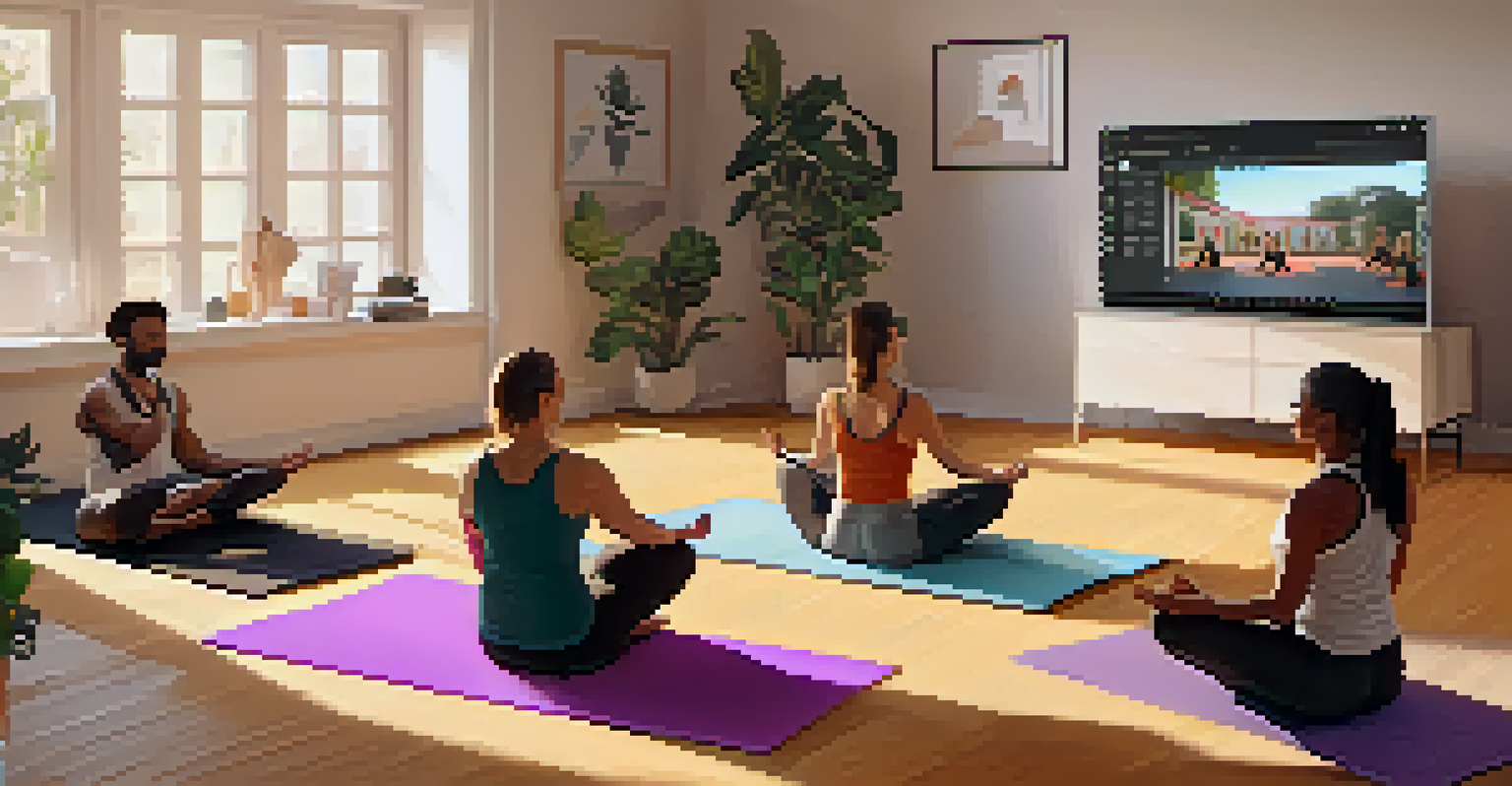The Impact of Social Media on LA's Fitness Culture

The Rise of Fitness Influencers in LA
In Los Angeles, fitness influencers have taken center stage, shaping trends and inspiring countless individuals. These social media personalities showcase their workouts, diets, and wellness tips, creating a powerful ripple effect across the fitness community. With platforms like Instagram and TikTok, influencers can reach thousands or even millions, making fitness more accessible and appealing.
Fitness is not about being better than someone else. It’s about being better than you used to be.
For many, following an influencer can feel like having a workout buddy right in their pocket. This sense of community encourages users to engage with fitness content and try new routines they might not have considered otherwise. It’s not just about aesthetics; many influencers promote mental well-being and self-love, aligning fitness with a holistic lifestyle.
Moreover, the rise of influencers has led to an explosion of fitness-related content, from challenges to tutorials. This constant stream of information empowers individuals to customize their fitness journeys while also holding them accountable. In a city as bustling as LA, this virtual support can make all the difference.
Social Media as a Fitness Marketing Tool
Social media has transformed the way fitness brands market their products and services. Gyms, apparel companies, and wellness products now use targeted ads and influencer partnerships to reach potential customers more effectively. This shift means that traditional advertising methods are often overshadowed by organic, relatable content that resonates with audiences.

For example, many local gyms in LA leverage social media to showcase success stories and testimonials, creating a sense of community and trust. This not only attracts new members but also fosters loyalty among existing ones. People want to see real results, and social media provides a platform for sharing transformative journeys.
Influencers Shape Fitness Trends
Fitness influencers in LA inspire individuals by sharing workouts and wellness tips, creating a sense of community and making fitness more accessible.
Additionally, brands often engage their audience through interactive content, such as polls, challenges, and giveaways. This not only increases brand visibility but also encourages user-generated content, where customers share their own experiences with the products. This creates a vibrant ecosystem around fitness brands, deeply rooted in the LA culture.
The Role of Online Fitness Communities
Online fitness communities have become a lifeline for many individuals in Los Angeles, especially during times of social distancing. Platforms like Facebook and Reddit host groups where members share advice, motivation, and personal stories. These communities foster a sense of belonging, allowing individuals to connect over shared goals and challenges.
The greatest wealth is health.
In addition to providing encouragement, these groups often serve as valuable resources for information on workouts, nutrition, and mental health. When someone posts a question about overcoming a fitness plateau, they can receive countless insights from others who have faced similar hurdles. This collective knowledge not only enhances personal fitness journeys but also builds lasting friendships.
Moreover, these communities often host virtual events, such as challenges or group workouts, further strengthening connections among members. In a city known for its fast-paced lifestyle, these online spaces allow individuals to prioritize fitness while feeling supported by like-minded peers. It's a perfect blend of convenience and camaraderie.
The Impact of Fitness Trends on Social Media
Social media is a breeding ground for fitness trends that can sweep through Los Angeles like wildfire. From the latest workout routines to unique diet plans, platforms like Instagram and TikTok play a pivotal role in popularizing these trends. When a new fitness craze emerges, it often garners immediate attention and participation from the community.
Take, for instance, the rise of high-intensity interval training (HIIT) workouts and yoga challenges shared widely online. People are eager to jump on the bandwagon, trying out new methods to stay fit while also sharing their experiences on social media. This not only adds variety to their routines but also allows for creative self-expression.
Social Media Transforms Marketing
Brands leverage social media for marketing by showcasing real success stories and engaging audiences through relatable content and interactive experiences.
However, while trends can inspire, they can also lead to misinformation or unrealistic expectations. It’s essential for individuals to discern between effective practices and fleeting fads. Ultimately, social media can be a double-edged sword, providing both motivation and potential pitfalls in the pursuit of fitness.
Mental Health and Fitness on Social Media
The connection between fitness and mental health is more prominent than ever on social media, especially in a city like Los Angeles, where the pressure to look and feel good is high. Many influencers and wellness advocates actively promote the idea that physical fitness is a crucial component of mental well-being. This message resonates with a broad audience, encouraging them to prioritize their health holistically.
Social media platforms often feature content that highlights the mental health benefits of exercise, such as reduced anxiety and increased mood. Users share personal stories of how fitness has transformed their lives, fostering a supportive environment where mental health discussions become normalized. These authentic narratives can be incredibly powerful, inspiring others to take their first steps toward a healthier lifestyle.
However, it's also essential to recognize the potential downsides of social media on mental health. The constant comparison to others can lead to feelings of inadequacy. Awareness and balance are key, encouraging individuals to curate their feeds to promote positivity and self-acceptance.
How Fitness Apps Integrate with Social Media
Fitness apps have become increasingly popular, especially when integrated with social media platforms. Many apps offer features that allow users to share their workouts, achievements, and progress with friends and followers. This social aspect not only motivates users to stay consistent but also enhances accountability through community support.
For example, apps like Strava and MyFitnessPal encourage users to connect with others, share tips, and celebrate milestones. This interaction creates a sense of camaraderie and friendly competition, pushing individuals to reach their fitness goals. In a city as dynamic as Los Angeles, these virtual connections can lead to real-world friendships and workout buddies.
Online Communities Foster Support
Online fitness communities provide motivation, resources, and a sense of belonging for individuals seeking to improve their fitness journeys.
Moreover, by sharing their fitness journeys online, users can inspire others to join the movement. As more people see their friends engaging in healthy habits, they may feel encouraged to start their own fitness journeys. This ripple effect showcases the power of social media in promoting wellness and fostering healthy lifestyles.
The Future of Fitness Culture in LA and Social Media
As social media continues to evolve, its impact on fitness culture in Los Angeles will likely grow even stronger. Emerging technologies, like virtual reality workouts and AI-driven fitness programs, are already making waves in the industry. These innovations will redefine how individuals engage with fitness, blending technology with personal goals seamlessly.
Additionally, the trend of hybrid fitness experiences—combining in-person and online classes—has gained traction, allowing more flexibility for individuals with busy schedules. This shift means that social media will play a crucial role in promoting and organizing these events, making fitness more accessible to everyone, regardless of their location or lifestyle.

Looking ahead, the focus will likely shift towards creating inclusive and diverse fitness spaces, both online and offline. Social media can amplify voices that promote body positivity and wellness for all, ensuring that everyone feels represented in the fitness community. In this way, social media will continue to be a driving force in shaping the future of fitness culture in LA.